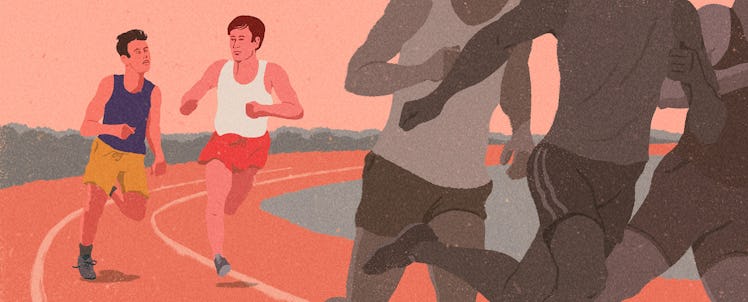Michael Reichert: A Letter to My Grandson About Insecurity and Its Antidote, Connection
Insecurity is a powerful force that can trap decent boys in a prison of their own cruelty — if they don't learn to face the feeling and stand up to the pressures.

Fatherly’s Letters to Boys project offers boys (and the men raising them) guidance in the form of heartfelt advice given generously by great men who show us how to take that crucial first step in confronting seemingly unsolvable issues — by offering honest words. Read all the letters here, or share your own.
Dear Grandson,
I want to put these thoughts to paper now, while I can, even though you’re too young to read them, because when we’re together I think a lot about the life you’ll lead. At the playground last week, you showed me how you could jump from higher and higher perches. I made a point to validate what a good jumper you were and you answered, “I’ll get better when I am bigger, Granddad.”
I hope you’re right in ways you can’t yet understand.
Right now, I teach an emotional literacy program at the prep school you may one day attend outside of Philadelphia. I want to tell you about one of my students. I’d largely ignored him — dismissing him as another lacrosse player, another preppy, another jock — until we started discussing boys’ relationships with other boys. When I explained that young men are hard on each other, he raised his hand and offered to tell his story. He talked about having been a bully in middle school and mistreating some of his classmates in the room. He was so honest that it was hard to listen both because he was right — he had been cruel — and because he was so obviously pained by it.
He turned red with shame, broke down, and began to cry when I asked how he had hurt the boys he targeted. His mind zeroed in on how he’d mistreated a boy who had since fled the school.
This boy explained that he’d felt insecure and feared that he wouldn’t be able to maintain his social standing with the popular boys. I marveled at how brave he was that he could let so many of his friends and classmates in on his struggle to become a better person. I could tell that he voluntarily endured the humiliation of public introspection because he wanted himself back.
The year progressed and I moved on because that’s how life works. I thought about the boy, but he wasn’t front of mind again until spring when I began counseling a younger boy, who was also a lacrosse player on the school team. He’d had a terrible illness as an early adolescent and was still recovering from his close brush with death. He had difficulty with the routine pressures of high school, sometimes becoming emotionally overwhelmed. His parents thought it might help him to talk to someone.
But being part of a team was the best medicine. Playing, even standing on the sidelines cheering, made him feel better. He was not particularly cool or social, but he had a clear role on the team. He was a goalkeeper — the player everyone counts on to keep the team in the game. He derived a sense of purpose and significance from contributing to the group effort. It kept him going.
He was a decent player, though not a starter. Nonetheless, he loved playing so much he had begun to imagine a future beyond high school. Problem was, he wasn’t very fast. He always came last in running drills. Competition among the players was merciless and he was falling behind.
Then, in one of our sessions, as tryouts began for the all-important 10th-grade season, he shared that during sprints the previous day one of the top players had slowed down to run with him all the way to the finish. The boy was moved that a senior starter had noticed him and was willing to risk his own standing with the coaches to be a good teammate. The boy who’d slowed down was the former bully.
As you get older, people will tell you that character is innate and fixed, that some have it and others don’t. Ignore these people. They haven’t seen what I’ve seen and they haven’t heard what I’ve heard. It’s my job to watch boys grow up and let me tell you this: You can change yourself into the person you want to be. You have the chance to do that every day.
The former bully didn’t slow down just to show solidarity with a teammate. He slowed down because he wanted to be the person that did that. When you try to be yourself, you will find that you naturally connect with others.
When you’re a bit older and a bit bigger, you’ll not only be able to jump from higher places, you’ll look around and start thinking about the heights other boys are jumping from. What I want to tell you is not that these heights don’t matter and that all things are equal, but that when you’re looking up at some of your peers and down at others, your perspective will get skewed. When that happens, you just need to think about yourself and be yourself. Do that and you’ll land on your feet no matter how far you fall.
With Love,
Grandfather
Michael C. Reichert, Ph.D., is an applied and research psychologist, independent practitioner, and leader for treatment teams in the juvenile justice system. His latest book, How to Raise a Boy: The Power of Connection to Build Good Men is out now.
This article was originally published on